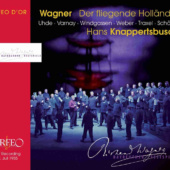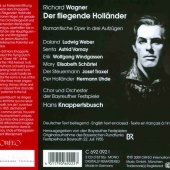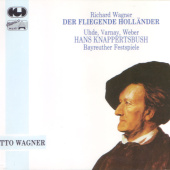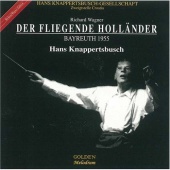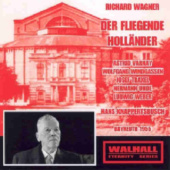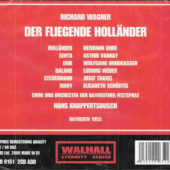Der fliegende Holländer
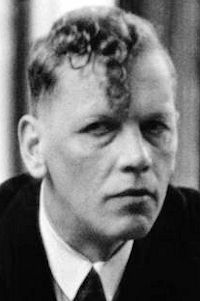
| Hans Knappertsbusch | |||||
| Chor und Orchester der Bayreuther Festspiele | ||||||
Date/Location
Recording Type
|
| Daland | Ludwig Weber |
| Senta | Astrid Varnay |
| Erik | Wolfgang Windgassen |
| Mary | Elisabeth Schärtel |
| Der Steuermann Dalands | Josef Traxel |
| Der Holländer | Hermann Uhde |
The present recording, here in its first official issue, is the opening night of the 1955 Bayreuth run that yielded the “live” (and stereo) Decca Keilberth-led performance, currently on Testament. Chalk and cheese could not differ more, and it’s a tribute to the singers (the same, with the exception of Wolfgang Windgassen’s Erik) that they were able to commute from Kna’s classical grandeur to Keilberth’s lusher romanticism. Both performances are of the inauthentic “one-act” version of the opera, incorporating the modifications that Wagner made to the score (notably the Tristan-style “redemption” ending to Overture and opera) between its 1843 premiere and 1860.
Maestro Knappertsbusch is on the concentrated form of his 1951 Munich Tristan. There is only one of his fabled “drop-outs” – from the “Ye holy angels bright” fanfare that launches the final chorus of the first scene through the ensuing transformation (he was probably used to an interval here). Otherwise all is steely strength, realised through dynamic sensitivity and spacious tempi that, as Astrid Varnay flagged up in her autobiography, never drag. His reading reminds one of the score’s indebtedness to Beethoven. The achievement of a classical sound with a large 20th-century orchestra seems to link the performance back to the days of Knappertsbusch’s old master Hans Richter. And it never sounds like an attempt to refashion the Holländer into a later “music drama”.
Any suspicion that Astrid Varnay, by this time an established Brünnhilde and Elektra, might sound too grand or “old” for Senta is soon swept away by her commitment to making voice and drama one. Her final pledge to the Dutchman (“Wohl kenn’ ich dich!”) is genuinely frightening – a human being going somewhere else. Hermann Uhde is not a word-turner to equal Hotter (for Krauss or Schüchter, Walhall) or Fischer-Dieskau (for Konwitschny, EMI) but he’s noble, tortured, hugely moving, and duets well with Varnay. Windgassen, cast perhaps against type, makes Erik a character study rather than a caricature, and is capable of some agile turns in the Cavatina. Adequately transferred by Orfeo – there are no technical credits either for 1955 or 2009 – the new issue catches an exciting first night and is musically competitive in a catalogue strangely bare of exciting modern recordings.
Mike Ashman | Issue 2/2010
During the 1950’s major conducting responsibilities at the Wagner Festival in Bayreuth
were shared by Hans Knappertsbusch and Joseph Keilberth. Usually each conducted one of the
two Ring cycles, which was a challenge for the musicians due to their very different approaches
to the score. Knappertsbusch was noted for his broad tempos and magisterial style while
Keilberth took a brisker, more Amodern approach to the music. Each usually conducted the
entire run of one of the other productions each season, with Knappertsbusch especially noted for
his powerful performances of Parsifal. In 1955, however, unusual circumstances resulted led the
two conductors to share in the performances of a new production of Der fliegende Hollander,
with Keilberth handling most of the rehearsals and conducting the three August performances
while Knappertsbusch led the final dress rehearsal and conducted the three July performances.
The opening night performance under Knappertsbusch was broadcast by the Bavarian Radio and
released many years later on CD by Orfeo, while the three Keilberth performances were recorded
by Decca and edited for release in mono on vinyl the following year. As an experiment Decca
also recorded these performances in the new technique of stereo but that version was not released
(also on vinyl) until 1970. In 2006 this stereo version was released on CD on the Testament
label. Orfeo’s release in 2009 of the performance conducted by Knappertsbusch created the
unusual situation of making available authorized recordings of two performances from the same
season with largely the same casts but different conductors.
Although the sound quality of Decca’s stereo recording under Keilberth is greatly
superior to that of Orfeo’s broadcast tape, both versions provide clear documentation of the the
conductors’ different approaches to the music. Knappertsbusch’s performances runs 2:33:52,
some 10% longer than Keilberth’s 2:20:54. The difference is even more striking than the
numbers imply since in many passages both conductors take similar tempos and
Knappertsbusch’s broader tempos only are found in individual scenes. In the some of these
moments, such as parts of the Senta-Dutchman duet in Act Two and in the final ensemble his
broad tempos force the singers to break phrases which they sing in one breath under Keilberth.
Both Astrid Varnay (Senta) and Hermann Uhde (Dutchman) display some vocal fatigue in the
Knappertsbusch version, although the pressures of opening night and the aftermath of intensive
rehearsals may be significant factors here. The Keilberth recording is a composite of three
performances and therefore can be selective in what it includes.
I have long been a fan of Knappertsbusch’s Wagner performances, including his unique
Parsifal and his Ring, both in the theatre and on recordings. However in this early work, which
is stylistically a mixture of old and new, I find Keilberth’s aggressive approach more effective,
which combined with Testament’s superior sound, leads me to prefer his performance over that
of Knappertsbusch.
Vocally both performances are outstanding. With her beautiful, focused sound, Varnay is
an ideal Senta and Uhde’s intense baritone is compelling as the Dutchman, if not as
overwhelming as the reigning Dutchman of the day, Hans Hotter. (Hotter sang the role in one of
the Knappertsbusch performances which was not recorded.) Ludwig Weber provides a sly
warmth of character as Daland along with his rich bass, and Joseph Traxel is a fresh-voiced if
rather monochrome Steersman. In the Knappertsbusch performance Wolfgang Windgassen is an
ardent and vocally attractive Erik, while his alternate in the Keilberth performances, Rudolf
Lustig, is competent but overly lachrymose in the role. These were great days at the Festival
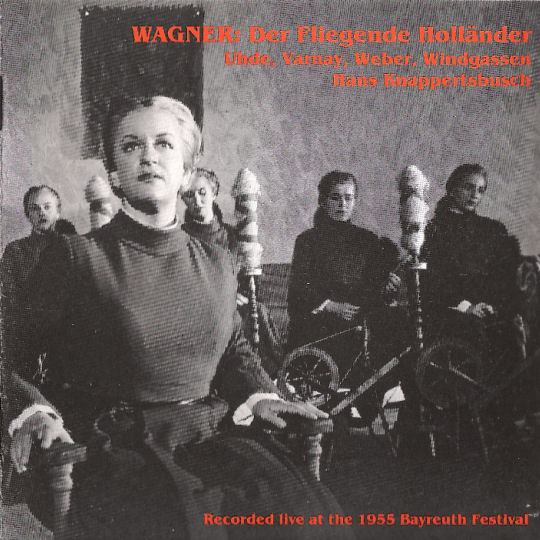
| Cetra, RR, Qualiton | |
| M&A, Orfeo, GM, Walhall Eternity, Hunt, OOA |
A production by Wolfgang Wagner (premiere)
This is the only time that Hans Knappertsbusch conducted Der fliegende Holländer in Bayreuth.

